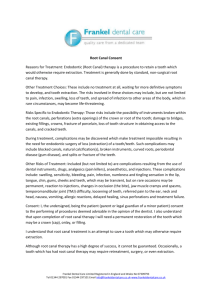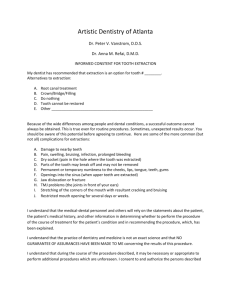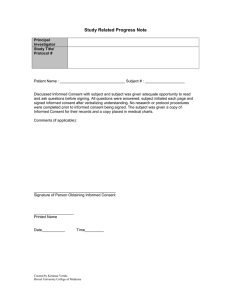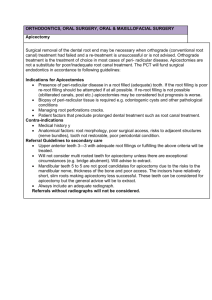Informed Consent
advertisement
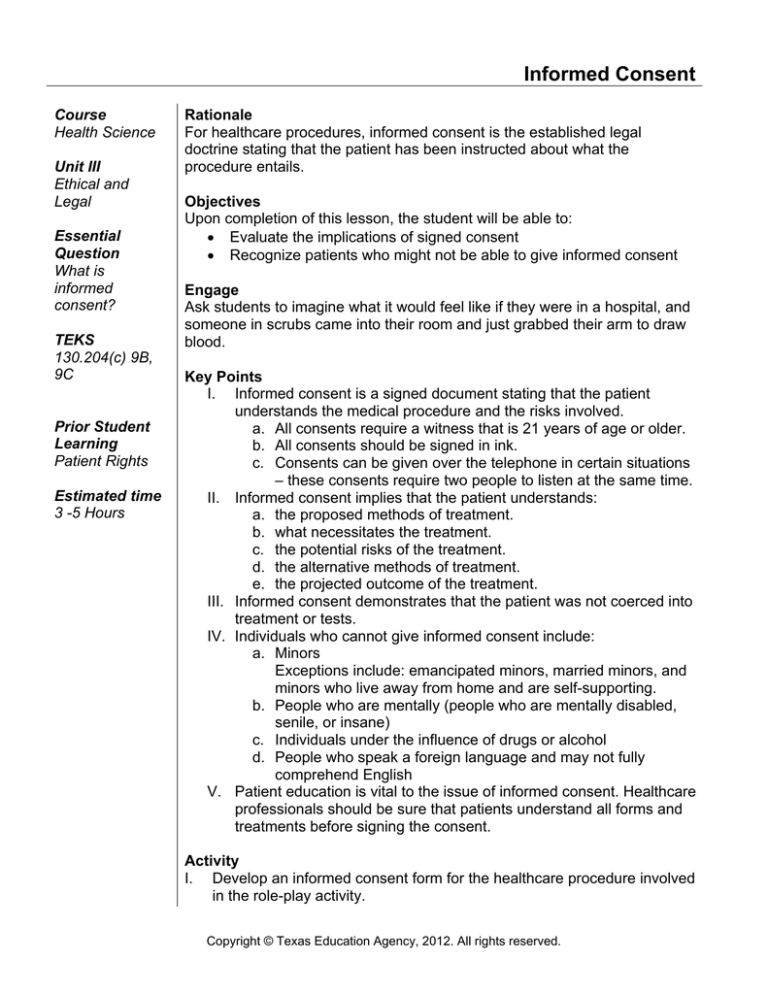
Informed Consent Course Health Science Unit III Ethical and Legal Essential Question What is informed consent? TEKS 130.204(c) 9B, 9C Prior Student Learning Patient Rights Estimated time 3 -5 Hours Rationale For healthcare procedures, informed consent is the established legal doctrine stating that the patient has been instructed about what the procedure entails. Objectives Upon completion of this lesson, the student will be able to: Evaluate the implications of signed consent Recognize patients who might not be able to give informed consent Engage Ask students to imagine what it would feel like if they were in a hospital, and someone in scrubs came into their room and just grabbed their arm to draw blood. Key Points I. Informed consent is a signed document stating that the patient understands the medical procedure and the risks involved. a. All consents require a witness that is 21 years of age or older. b. All consents should be signed in ink. c. Consents can be given over the telephone in certain situations – these consents require two people to listen at the same time. II. Informed consent implies that the patient understands: a. the proposed methods of treatment. b. what necessitates the treatment. c. the potential risks of the treatment. d. the alternative methods of treatment. e. the projected outcome of the treatment. III. Informed consent demonstrates that the patient was not coerced into treatment or tests. IV. Individuals who cannot give informed consent include: a. Minors Exceptions include: emancipated minors, married minors, and minors who live away from home and are self-supporting. b. People who are mentally (people who are mentally disabled, senile, or insane) c. Individuals under the influence of drugs or alcohol d. People who speak a foreign language and may not fully comprehend English V. Patient education is vital to the issue of informed consent. Healthcare professionals should be sure that patients understand all forms and treatments before signing the consent. Activity I. Develop an informed consent form for the healthcare procedure involved in the role-play activity. Copyright © Texas Education Agency, 2012. All rights reserved. II. Role-play a medical professional who must explain a medical procedure and obtain informed consent (HIV test, removal of skin cancer, an endoscopy). III. Complete the Tuskegee activity and discuss the events. IV. View the movie “Miss Evers’ Boys.” Teacher Note: Sample informed consent forms can be obtained from the hospital Assessment Role-Play Rubric Project Rubric Materials Sample Consent Form(s) www.cdc.gov Movie: “Miss Evers’ Boys” Accommodations for Learning Differences For reinforcement, the student will outline a healthcare situation requiring informed consent. For enrichment, the student will summarize and write a report on the following court cases: 1. Doe v. Ohio State University Hospitals and Clinics, 663 N.E. 2d 1369 (Ohio Ct. of App., Sept. 19, 1995). Hospital sued for performing HIV test without informed consent. 2. Zinermon v. Burch, 110 S Ct. 975 U.S. Sup. Ct., Feb.27, 1990). Patient not competent to sign forms. National and State Education Standards National Health Science Cluster Standards HLCO2.01 Communications Health care workers will know the various methods of giving and obtaining information. They will communicate effectively, both orally and in writing. TEKS 130.204(c)(9)(B) examine legal and ethical behavior standards such as Patient Bill of Rights, Advanced Directives, and the Health Insurance Portability and Accountability Act; 130.204(c)(9)(C) investigate the legal and ethical ramifications of unacceptable behavior; and Texas College and Career Readiness Standards English/Language Arts Standards IV Listening A 1 & 2, B 1 & 3 V Research C 1, 2 Social Studies Standard V Effective Communication A 1 Cross Disciplinary Standards I Key Cognitive Skills C 1 Copyright © Texas Education Agency, 2012. All rights reserved. The Syphilis Study at Tuskegee In 1932, the Public Health Service, working with the Tuskegee Institute, began a study to record the natural history of syphilis in the hopes of justifying treatment programs for blacks. It was called the "Tuskegee Study of Untreated Syphilis in the Negro Male." The goal of the study was to observe the long-term effects of syphilis. Syphilis is a complex, sexually transmitted disease (STD) with a highly variable clinical course. The disease is caused by the bacterium, Treponema pallidum. Syphilis is passed from person-to-person through direct contact with a syphilis sore and can also be passed from mother to child during pregnancy. The study initially involved 600 black men from Macon County, Alabama – 399 with syphilis, 201 who did not have the disease. The study was conducted without the benefit of patients' informed consent. Researchers told the men they were being treated for "bad blood," a local term used to describe several ailments including syphilis, anemia, and fatigue. In truth, they did not receive the proper treatment needed to cure their illness even after the introduction of penicillin therapy in 1943. In exchange for taking part in the study, the men received free medical exams, free meals, and burial insurance. Although originally projected to last 6 months, the study actually went on for 40 years. The study was exposed on June 26, 1972. At the time, 74 participants were still living. In May 1997, President Clinton apologized for the Tuskegee Syphilis Study. Was the study unethical in 1932? Should it ever have been started? Did the subjects provide informed consent? Was it ethical at first, but then unethical after penicillin was discovered? Could this study have been done differently? Should it have been done differently? Adapted from: http://www.cdc.gov/tuskegee/timeline.htm Copyright © Texas Education Agency, 2012. All rights reserved. Sample Patient Information/Informed Consent Form This information is provided to help you understand the treatment I am recommending for you. Before I begin treatment, I want to be certain that I have provided you with enough information in a way you can understand, so that you’re well informed and confident that you wish to proceed. This form will provide some of the information. I will also have a discussion with you. PLEASE BE SURE TO ASK ANY QUESTIONS YOU WISH. It’s better to ask them now, than wonder about it after we start the treatment. Nature of the Recommended Treatment: I am recommending the following treatment(s) for you: _________________________________________ I base this recommendation on the visual examination(s) I have performed, on any X-rays, models, photos and other diagnostic tests I have taken, and on my knowledge of your medical and dental history. I have also taken into consideration any information you have given me about your needs and wants. The treatment is necessary because:_______________________________________________________________________ The benefits of this treatment are: ___________________________________________________________ _______________________________________________________________________________________ The prognosis, or chance of success, of the treatment is:__________________________________________ I expect that it will take approximately ______________________to complete the treatment, but it could be shorter or longer based on what we experience as the treatment progresses. I expect it to cost about $ ______________and I will let you know as soon as possible if the cost estimate increases or if it can be reduced. Alternative Treatments: There are many ways to treat dental problems. I have chosen the one that I think best suits your needs. However, there are other ways that your condition can be treated, including: _______________________________________________________________________________________ If you have any questions about these alternatives, or about any other treatments you have heard or thought about, please ask. Risks Of The Recommended Treatment No dental treatment is completely risk free. I will take reasonable steps to limit any complications of the treatment I have recommended. However, there are some complications that tend to occur with some regularity. These include: ______________________________________________________________ If you have any questions about these complications, or about any other complications you have heard or thought about, please ask. I believe that the treatment will be most successful when you understand as much as possible about it, because you will be able to provide more information to me and ask better questions. No question is too simple to ask and I have as much time to answer them as you need. When you feel you can make an educated decision about this recommendation, then we can get started with treatment. Copyright © Texas Education Agency, 2012. All rights reserved. Acknowledgment I, _____________________________________, have received information about the proposed treatment. I have discussed my treatment with Dr.________________________, and have been given an opportunity to ask questions and have them fully answered. I understand the nature of the recommended treatment, alternate treatment options, and the risks of the recommended treatment. I wish to proceed with the recommend treatment. Signed:___________________________________________ Date:________________________ Patient or Guardian Signed:___________________________________________ Date:________________________ Treating Dentist Signed:___________________________________________ Date:________________________ Witness Signed: __________________________________________ Date:________________________ Copyright © Texas Education Agency, 2012. All rights reserved. General Dentistry Informed Consent Form 1. Treatment Plan I understand the recommended treatment and my financial responsibility as explained to me. I understand that by signing this consent I am in no way obligated to any treatment. I also acknowledge that during treatment it may be necessary to change or add procedures because of conditions found while working that were not discovered during examination. For example, root canal therapy following routine restorative procedures. Drugs and Medications I understand that antibiotics, analgesics, and other medications can cause allergic reactions such as redness and swelling tissue, pain, itching, vomiting, and/or anaphylactic shock. Extractions Alternatives to removal of teeth have been explained to me (root canal therapy, crown and bridge procedures, periodontal therapy, etc.) I understand removing teeth does not always remove the infection, if present, and it may be necessary to have further treatment. I understand the risks involved in having teeth removed, some of which are pain, swelling, spread of infection, dry socket, fractured jaw, or loss of feeling in my teeth, lips, tongue and surrounding tissue (paresthesia) that can last for an indefinite period of time. I understand I may need further treatment by a specialist if complications arise during or following treatment, the cost of which is my responsibility. Crown's, Bridges, Veneers I understand that sometimes it is not possible to match the color of natural teeth exactly with artificial teeth. I further understand that I may be wearing temporary crowns which come off easily, and that I must be careful to ensure that they are kept on until the permanent crown is delivered. I realize the final opportunity to make changes (shape, fit, size and color) will be before cementation. It is also my responsibility to return for permanent cementation within 20 days from tooth preparation. Excessive delays may allow for tooth movement. This may necessitate a remake of the crown or bridge. I understand there will be additional charges for remakes due to my delaying permanent cementation. Endodontic Therapy I realize there is no guarantee that root canal treatment will save my tooth, and that complications can occur from the treatment, and that occasionally root canal filling material may extend through the tooth which does not necessarily affect the success of the treatment. I understand that endodontic files and reamers are very fine instruments and stresses and defects in their manufacture can cause them to separate during use. I understand that occasionally additional surgical procedures may be necessary following root canal treatment (apicoectomy). I understand that the tooth may be lost in spite of all efforts to restore it. Periodontal Disease I understand that I have been diagnosed with a serious condition, causing gum and bone inflammation and/or loss, and that the result could lead to the loss of teeth. Alternative treatments have been explained to me, including gum surgery and tooth extraction and/or replacement. Copyright © Texas Education Agency, 2012. All rights reserved. Fillings I understand that care must be exercised in chewing on filled teeth, especially during the first 24 hours, to avoid breakage. I understand that a more extensive restorative procedure than originally diagnosed may be required due to additional or extensive decays. I understand that significant sensitivity is a common aftereffect of newly placed fillings. Partials And Dentures I understand that the wearing of partials/dentures is difficult. Sore spots, altered speech, and difficulty in eating are common problems. Immediate dentures (placement of dentures immediately after extractions) may be painful. Immediate dentures may require considerable adjusting and several relines. A permanent reline will be needed at a later date. This is not included in the denture fee. I understand that it is my responsibility to return for delivery of my partial/denture. I understand that failure to keep my delivery appointment may result in poorly fitted dentures. If a remake is required due to my delays of more than 30 days, additional charges could be incurred. I understand that dentistry is not an exact science and that, therefore, reputable practitioners cannot guarantee results. I acknowledge that no guarantee or assurance has been made by anyone regarding the dental treatment which I have requested and authorized. Patient__________________________________ Date_________________ Clinical Staff_____________________________ Date_________________ Copyright © Texas Education Agency, 2012. All rights reserved. Health Questionnaire Acknowledgment and Consent to Proceed I certify that the answers to the health questions are accurate and correct to the best of my knowledge. Since a change of medical condition or medications can affect dental treatment, I understand the importance of, and agree to, notifying the dentist of any changes at any subsequent appointment. I authorize Dr.___________ and/or such associates or assistants as s/he may designate to perform those procedures as may be deemed necessary or advisable to maintain my dental health, or the dental health of any minor or other individual for which I have responsibility, including arrangement and/or administration of any sedative (including nitrous oxide), analgesic, therapeutic, and/or other pharmaceutical agent(s), including those related to restorative, palliative, therapeutic, or surgical treatments. I understand that the administration of local anesthetic may cause untoward reactions or side effects, which may include, but are not limited to, bruising, hematoma, cardiac stimulation, muscle soreness, and temporary, or rarely, permanent numbness. I do voluntarily assume any and all possible risks, including the risk of substantial and serious harm, if any, which may be associated with general preventive and operative treatment procedures, in hopes of obtaining the potential desired results, which may or may not be achieved, for my benefit or the benefit of my minor child or ward. I understand that placement of fillings may render the involved teeth sensitive to hot and cold temperatures and/or pressure for an extended period of time. I acknowledge that the nature and purpose of the foregoing procedures have been explained to me, if necessary, and I have been given the opportunity to ask questions. _______________________________________________ Patient’s Signature ______________________________________ Date _______________________________________________ Parent or Legal Guardian (if patient under 18 yrs of age) ______________________________________ Date Copyright © Texas Education Agency, 2012. All rights reserved. DENTAL SERVICES CONSENT FOR SURGERY Patient Name__________________________________________Date of Birth_________________________ I hereby authorize Dr.______________________________, and any other dentists of ____________________, to perform the following treatment or surgical procedure:____________________________________, and I understand that this is an elective, urgent, or emergency procedure (circle one). I have been informed that the risks to my health if this procedure is not performed include, but are not limited to, pain, infection, cyst formation, loss of bone around teeth causing their loss, and an increased risk of complications, if surgery is postponed. I have been informed of any possible alternative methods of treatment should any exist. Further, I understand that there are certain inherent and potential risks in any treatment or procedure, and that in this specific instance, such risks may include the following: 1. 2. 3. 4. 5. 6. 7. 8. 9. 10. 11. 12. Postoperative discomfort and swelling that may necessitate several days of home recuperation. Resticted mouth opening for several days or weeks. Prolonged bleeding. Nausea and vomiting (usually associated with medications prescribed for pain). Postoperative infection requiring additional treatment. The decision to leave a small piece of root in the jaw when its removal would require extensive surgery. Damage to adjacent teeth, fillings, and crowns. Stretching of the corners of the mouth with resulting cracking and bruising. Opening into the maxillary nasal sinus or nose, requiring additional surgery. Prolonged drowsiness. Change in occlusion and temporal-mandibular joint difficulty. Injury to the nerve underlying the teeth, resulting in numbness or tingling of the lip, chin, gums, cheek, teeth, and/or tongue on the operated side. This may persist for several weeks, months, or in remote instances, be permanent. 13. Fracture of the jaw. ( ) I consent to the administration of local anesthesia (Novocain), nitrous oxide analgesia, or oral sedation in connection to the procedure referred to above (circle all that apply). I certify that I have read the above and fully understand this consent for surgery, and that I understand that a perfect result cannot be guaranteed. If unexpected problems arise during the procedure, the doctor has my permission to do what is deemed necessary to correct the condition. Drugs given at the time of surgery for sedative purposes or control of pain following the surgery may cause drowsiness and a lack of awareness or coordination. If instructed to do so, I will not drive or perform hazardous chores until I have recovered from the effects of these medications. _______________________________________________ Patient’s Signature ______________________________________ Date _______________________________________________ Parent or Legal Guardian (if patient under 18 yrs of age) ______________________________________ Date _____________________________________________ Witness or Interpreter ______________________________________ Date _____________________________________________ Dentist’s Signature ______________________________________ Date Copyright © Texas Education Agency, 2012. All rights reserved. DENTAL PROGRAMS CONSENT FOR ENDODONTIC (ROOT CANAL) SERVICES Patient Name____________________________________Date of Birth____________________________ I hereby authorize Dr. _____________________________, and any other dentists of _______________ to perform an endodontic (root canal) procedure on tooth (teeth) #_________________________________, and I understand that this is an elective, urgent, or emergency procedure (circle one). Root canal therapy is indicated when the pulp chamber of a tooth is contaminated by bacteria, causing the canals to become infected. The procedure is accomplished when the dentist creates a small opening in the biting surface of the tooth that will allow it to be disinfected and then sealed with an inert, rubber-like substance. The sealing of the canals prevents subsequent passage of bacteria into or out of the tooth. I have been informed that the risks to my health if this procedure is not performed may include, but are not limited to: increased pain, swelling, loss of the tooth (teeth), loss of other teeth nearby, loss of the supporting bone, spreading infection, cyst formation, and/or deterioration of general health due to systemic infection. I have been informed of possible alternative methods of treatment, should any exist. Further, I understand that there are certain inherent and potential risks in any treatment or procedure, and that in this specific instance, such risks may include the following: A failure to completely eliminate the infection, requiring retreatment, root surgery, or removal of the tooth at a later date; Post-operative pain, swelling, bruising, and/or limited jaw opening that may persist for several days; Separation (breakage) of an instrument within the canal during treatment. Broken instrument tips are typically allowed to remain in the canal, and only rarely are they the cause of subsequent problems. If removal is indicated the patient may be referred to an endodontic specialist; Perforation of the root from within the canal can occur, requiring additional treatment by a specialist. Such complications will occasionally result in the loss of the tooth; Damage to nerves supplying the teeth resulting in temporary or, in rare instances, permanent numbness or tingling of the lip, chin, or other areas of the jaws or face; Inability to adequately clean the canal(s) due to unforeseen calcified obstructions or severely bent roots. Under certain circumstances the patient may be referred to a specialist for successful completion of the procedure. Loss of the tooth may occur; A fracture of the treated tooth, occurring during or after endodontic treatment. Treated teeth sometimes break due to the tooth’s loss of strength resulting from the procedure. In most cases a crown is recommended after treatment to prevent such an occurrence. Once treatment has begun, it is essential that it be completed in a timely manner. Root canal treatment will require from 1-5 appointments. Also, I understand that successful treatment does not prevent future decay or fracture of the treated tooth. I understand the recommended treatment, the risks of such treatment, alternative treatments should any exist, and the consequences of doing nothing. Patient’s Signature_________________________________________________ Date_________________ Parent or Legal Guardian Signature____________________________________ Date_________________ Witness or Interpreter_______________________________________________ Date_________________ Dentist’s Signature_________________________________________________ Date_________________ Copyright © Texas Education Agency, 2012. All rights reserved.
